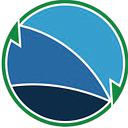
As our climate changes, hurricanes do as well. Recently, Gulf storms have been rapidly intensifying as they approach landfall, due to warmer ocean temperatures and surplus atmospheric moisture. While scientists have made significant improvements in predicting hurricane trajectories, forecasting a hurricane’s rapid intensification remains challenging. Intensity forecasting could be greatly improved by collecting more data below the ocean’s surface. This summer, Seatrec ventured to Louisiana and Florida to make history by deploying the first sustainable profiling floats in the Gulf of Mexico with the goal of capturing as much ocean data as possible. To date, our Louisiana float alone has already completed 365 profiles!
📰 This Deep Dive’s highlights:
- Live data from the Gulf and our video on Measuring Hurricane Intensity
- NOLA.com article on our Louisiana deployment
- We’re a Gulf Blue Navigator Finalist!
🌊 Seatrec in the Gulf
In May, Seatrec launched Project FISH (Fast Insights to Scope Hurricanes), our mission to forge alliances with fishing associations, charters, and world-class anglers to better understand ocean processes, including how they influence hurricane intensity. We deployed our first float (a Navis float equipped with a single Seatrec SL1 energy harvesting system), which is profiling approximately every eight hours to a depth of 750 meters. To track our float’s trajectory and data, click here.

🌀Video on Hurricane Intensification
Recently, Seatrec released this video featuring our work in the Gulf.
🐟 Project FISH Launches in Cocodrie, Louisiana
NOLA.com reporter Roshaun Higgins interviewed our CEO, Yi Chao, about Project FISH. Higgins’ article titled, “A robot will rove the Gulf this year to study heat and hurricanes,” does a great job of capturing our technology and mission.
By collaborating with fishing charters and anglers, bluetech startups and scientists can share transportation costs associated with deploying oceanic equipment. Currently, most startups have to charter ocean research vessels which are expensive, require significant advance planning, and travel relatively slowly. Looking to deploy quickly before the hurricane season, Seatrec partnered with charter owner Lane Wall and Captain Todd Black at FishHeadsLA. Fishheads is based in Cocodrie, Louisiana, an area devastated by Hurricane Ida, so the crew took a personal interest in our goal to better predict storm intensity. And they also happened to have one of the fastest boats on the Gulf. World-record-holding angler and IGFA representative Steve Wozniak (no, not the Apple guy) couldn’t resist the opportunity to come along for a chance at a new species.
On May 16th, the Fishhead’s crew took three Seatreckers and Wozniak on a 150-mile sea journey to reach an area with depths over 2,000 meters. It was there we deployed the first sustainable profiling float in the Gulf. The deployment was seamless, and on the way back, Wozniak caught species #2076, a yellowmouth grouper.

🔍🐟 Projects FIND and FISH — Destin, Florida
Four months after the Cocodrie deployment, we headed out to Destin, Florida (where the FishheadsLA team spends their summers) for our second deployment in the Gulf. This time our float was equipped with two energy harvesting modules, essentially doubling its energy production every time it surfaces. We launched this float on behalf of Team Mexico from Project FIND, our mission to democratize ocean science. The launch went smoothly, with the float successfully deployed over approximately 2000m depth. (And on the way back, Wozniak caught his 2100th species — a scamp grouper!

🔹 Mississippi, here we come!
We’re excited to announce that Seatrec was selected as one of six startups to join the inaugural Gulf Blue Navigator Program established by the University of Southern Mississippi Research Foundation and SeaAhead. Seatrec was selected from a pool of 48 applicants representing 12 countries.
🌊 Blue Innovation
Ocean tech continues to get more attention. New venture firms such as Propeller are surfacing, and bluetech conferences are now regular events. Seatrec exhibited at The 5th Annual Blue Innovation in Santa Cruz, which connects researchers, organizations, and community members who are passionate about protecting our ocean and water sources. One of many highlights was the interactive art installation, “Fore the Waves,” made from 50,000 plastic golf balls collected by freedivers in the waters off Pebble Beach. Rethinking what we dump into our ocean is critical to protecting it.


🧭 Welcome, Josh Laney (The Adventurer)

Meet Josh Laney, Seatrec’s new Firmware Engineer. Josh is a student of all things computer and has worked in robotics, space communications, and electronic device fabrication. He views engineering as a complex layering of abstraction and makes it his mission to understand the problem at every layer, from the underlying physics to the complex goals of the overall system. In both his work and his life, Josh is constantly challenging the assumptions of his environment. He holds an MSc. in Analogue and Digital Integrated Circuit Design from Imperial College London and a BS in Electrical Engineering and Computer Engineering from the University of Virginia.
🫶 Revolutionizing Ocean Science via Collaboration
This past hurricane season, we witnessed a tragic loss of life and billions in devastation from Hurricane Ian. More than ever, we need improved hurricane forecasting. By creating new, cost-effective ways to launch oceanic equipment and capture data, we can spark new alliances with many blue economy communities and improve our ocean knowledge. The UN’s Ocean Decade mandate encourages existing stakeholders to create new collaborations and move beyond business as usual to create a revolution in ocean science. The goal of this revolution is to benefit humanity by strengthening the management of our oceans and coastlines. Seatrec’s projects aim to foster as many collaborations as possible and were thrilled and grateful to get a shout-out about Project NEMO from Secretary-General of the International Hydrography Organization Mathias Jonas.
Together, we can make this happen.
Seatrec
